牛津译林版七年级上册英语知识点整理归纳
Unit1-Unit4知识点归纳牛津译林版英语七年级上册(2)

Unit1 知识点汇总Wele to the unit and ic strip1.Oh, l love edogs. 哦,我喜欢电子狗。
love v. 喜爱,钟爱(重点掌握)搭配:love doing(动词的ing形式)sth 喜欢做某事类似的搭配:like/love/enjoy doing sth 喜欢某事或者干某事(爱好)存在love to do sth以及like to do sth, 这些词组意思就是一时兴起做某事,做这个事情时间不长。
<翻译练习>她喜欢早上阅读一些书籍。
She likes reading some books in the morning.(她喜欢早上阅读一些书籍。
)edog n.电子狗e是electronic的简写例子:email(电子邮件), ebook (电子书)<启东作业本P1 一(8)>I _______(喜欢)eating icecream on a hot day. It tastes good.答案:love/like2.She likes music. 她喜欢音乐。
(问喜欢什么东西):What does she like?(问喜欢干什么):What does she like doing?3.My name is Hobo. 我的名字叫Hobo。
(重点掌握)(一般疑问句及肯定和否定回答)例子:(1)Is your name Hobo?(这边是对Hobo的名字进行提问,而不是对Hobo这个人进行提问)Yes, it is. No, it isn’t(2)Are you my master?Yes, I am. No, I am not.<第一次周练一(15)>(D)Is your name Daniel?________.What about yours?A.Yes, I am.B.No,he isn’tC.No, I’m notD.Yes, it is.4.Now let’s read this book.现在读读这本书吧。
牛津译林版英语七年级上册分单元知识点归纳总结(Unit1-8))

牛津译林版英语七年级上册全册知识点归纳总结(最新)一、词汇知识点整理:\ 照顾 ;表示的短语:照顾看…;寻找看起来像…在第一天 , (先说班级,再说年级,且大写)。
踢足球放学后\ 来自 \ 擅长放风筝回家听音乐 a 玩游戏戴眼镜在学校所有的课程谈论那里 a 许多爱好二、结构用法:\ 喜欢做某事’s +动词原形让我们I \ 我叫+地点欢迎来到这是\ 擅长做……在几年级几班= + 地点, 意思是“来自某地”。
Nanjing. P8 他来自南京。
……和谁住在哪里和某人住一起;城市名,住在某地;住在一楼(用介词)I’m … . 我几岁了。
(s) ,……岁,如果数词大于1,要用复数.问年龄要用“几岁”提问。
例如:- ? 11. 应填 .I ().我留着短(长)头发三、句式用法’s ?你叫什么名字?! 很高兴见到你。
I . 我喜欢阅读英语.表示“喜欢”的用法:喜欢喜爱喜欢 + 形式。
’s . 现在让我们认识下我们的新同学。
I .放学后我经常踢足球。
. 她个头很高,身材苗条。
Nanjing. 他来自南京。
Nanjing.. 他擅长于数学。
.11 .米莉11岁。
.他们都很好。
I . 我擅长于跳舞。
四、语法归纳:连系动词的一般现在时动词的三变化 .我(I)用 ,你()用用于他()她()它(),单数名词用,复数名词都用句型结构:1、肯定句:主语\\ … a .2、否定句:主语\\… a .3、一般疑问句:\\主语+其他? a ? 回答 , . , ’t4、特殊疑问句:疑问句 +主语+其他?’s ?语法小练习:用动词的适当形式填空1、 . .2、 I3、? a4、 ? , I5、 ? .一、词汇知识点整理:做运动 a 一天许多次踢足球/打网球谈论放学后去游泳a …中的一员来自听音乐在下届世界杯实现’s 在某人的空闲时间住/生活在看书在周末待在家里 a 许多问某人某事在电视上看篮球比赛感觉特棒二、结构用法:?做…怎么样?喜欢做某事使某人/某物使某人做某事想要做某事希望做某事做某事开心三、句式用法I . 我喜欢散步。
Unit1知识点梳理2023-2024学年牛津译林版英语七年级上册

第一讲 7A Unit1 Language Point 梳理一.Unit 1 重点语法1.would like / love sth.想要某物例句:Would you like some water?肯定回答:Yes, please. Yes, I’d like / love to.否定回答:No, thanks.2.would like / love to do sth.想要做某事例句:Would you like to drink some water?肯定回答: Yes, I’d like / love to.否定回答:I’d like / love to, but …… .3.糖葫芦形容词结构:数词+ 名词(单数) + (形容词)例:80foothigh 80 英尺高fiveinchtall 5英寸高的7yearold 7岁的注意:①名词必须用单数②只能放在名词前作定语,不能放在be 动词后作表语。
4.read/look/see/watch几个“看”的用法和区别:look 强调看的动作①系动词。
译作看起来,后接形容词。
She looks happy.②不及物动词。
译作看,词组:look at…,用副词修饰。
Tom looked at me angrily.see 及物动词,译作看到,无进行时态,强调看的结果。
watch 及物动词,译作观看,注视。
强调观看正在进行中的,发生变化的活动过程,常用于看电视、看球赛、看演出等。
read 及物动词,译作阅读。
强调看文字内容的东西,常用于看书、看报纸、看杂志等。
5.疑问代词what、which、who 及疑问副词how、when 、where可以和动词不定式连用。
what to do 做什么which to do 做哪个who to do 如何做how to do 谁做when to do 什么时候做where to do 在哪里做6.“疑问词+ to do” 结构经常放在know,learn,see ,ask等动词后做宾语。
Unit1重要知识点牛津译林版英语七年级上册
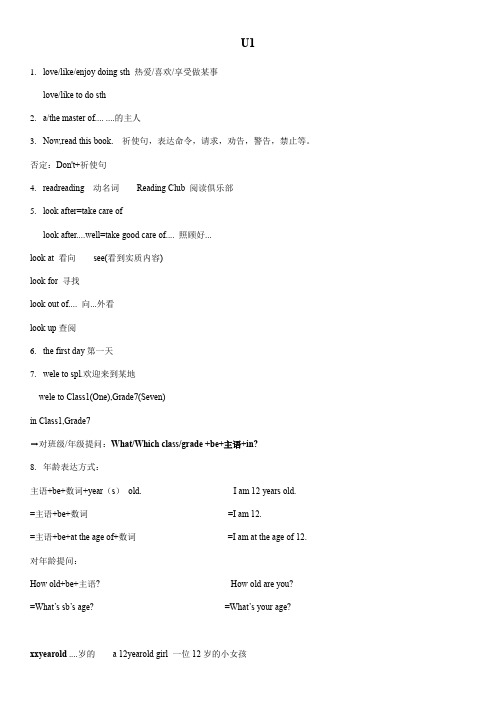
U11.love/like/enjoy doing sth 热爱/喜欢/享受做某事love/like to do sth2.a/the master of.... ....的主人3.Now,read this book. 祈使句,表达命令,请求,劝告,警告,禁止等。
否定:Don't+祈使句4.readreading 动名词Reading Club 阅读俱乐部5.look after=take care oflook after....well=take good care of.... 照顾好...look at 看向see(看到实质内容)look for 寻找look out of.... 向...外看look up查阅6.the first day第一天7.wele to spl.欢迎来到某地wele to Class1(One),Grade7(Seven)in Class1,Grade7➡对班级/年级提问:What/Which class/grade +be+主语+in?8.年龄表达方式:主语+be+数词+year(s)old. I am 12 years old.=主语+be+数词=I am 12.=主语+be+at the age of+数词=I am at the age of 12.对年龄提问:How old+be+主语? How old are you?=What’s sb’s age? =What’s your age? xxyearold ....岁的 a 12yearold girl 一位12岁的小女孩9.play+球类运动play footballplay the+乐器名词play the piano10.after class/school/lunch....11.be from=e from 来自Where +be+主语+from?=Where+助动词+主语+e from?12.be good at (doing ) sth=do well in (doing) sth 擅长做某事(=do sth well)13.★Be动词的一般现在时14.at the age of... 在...岁时15.go walking➡go+ving=go for a walkgo swimming=go for a swim16.glad/nice to meet you. ➡It's glad/nice to meet you.It’s+adj.+to do sth做某事....17.I see.我明白了。
牛津译林版七年级上英语知识点总结
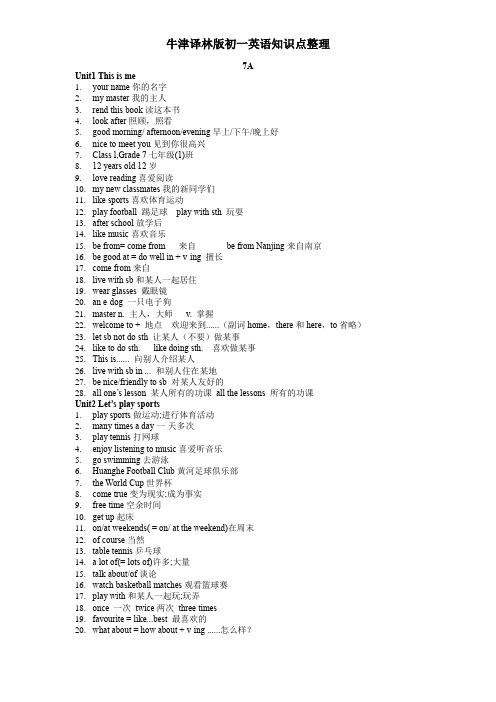
7AUnit1 This is me1.your name你的名字2.my master我的主人3.rend this book读这本书4.look after照顾,照看5.good morning/ afternoon/evening早上/下午/晚上好6.nice to meet you见到你很高兴7.Class l,Grade 7七年级(1)班8.12 years old 12岁9.love reading喜爱阅读10.my new classmates我的新同学们11.like sports喜欢体育运动12.play football 踢足球play with sth 玩耍13.after school放学后14.like music喜欢音乐15.be from= come from 来自be from Nanjing来自南京16.be good at = do well in + v-ing 擅长e from来自18.live with sb和某人一起居住19.wear glasses 戴眼镜20.an e-dog 一只电子狗21.master n. 主人,大师v. 掌握22.welcome to + 地点欢迎来到......(副词home,there和here,to省略)23.let sb not do sth 让某人(不要)做某事24.like to do sth. like doing sth. 喜欢做某事25.This is...... 向别人介绍某人26.live with sb in ... 和别人住在某地27.be nice/friendly to sb 对某人友好的28.all one’s lesson 某人所有的功课all the lessons 所有的功课Unit2 Let’s play sports1.play sports做运动;进行体育活动2.many times a day一-天多次3.play tennis打网球4.enjoy listening to music喜爱听音乐5.go swimming去游泳6.Huanghe Football Club黄河足球俱乐部7.the World Cup世界杯e true变为现实;成为事实9.free time空余时间10.get up起床11.on/at weekends( = on/ at the weekend)在周末12.of course当然13.table tennis乒乓球14. a lot of(= lots of)许多;大量15.talk about/of谈论16.watch basketball matches观看篮球赛17.play with和某人一起玩;玩弄18.once 一次twice两次three times19.favourite = like...best 最喜欢的20.what about = how about + v-ing ......怎么样?21.be a member of = be in 成为......其中的一员22.look +adj look at + adv23.in one’s free/spare time 在某人的空闲时间24.enjoy doing sth 喜欢做某事25.make sb. do sth.使/让某人做某事make sb./sth. + adj.使某人/某物处于.....状态26.want to do sth = would like to do sth 想要做某事27.hope to do sth 希望做某事hope sb will/can do sth 希望某人做某事没有hope sb to do sth28.talk with sb about sth 和某人谈论某事29.fun 不可数名词funny 有趣的have fun +v-ing 做某事玩得愉快30.feel + adj31.reading is fun. 动名词作主语,谓语动词用单数形式。
完整版)译林牛津初一上册英语知识点归纳

完整版)译林牛津初一上册英语知识点归纳Unit 1: This is me!In this unit。
we will learn some ___。
These include "look after" or "take care of" to mean to care for someone。
"on the first day" to refer to the first day of school。
"play football" to mean to play soccer。
"after school" to mean after classes are over。
"be good at" or "do well in" to mean to excel in something。
"fly kites" to mean to fly a kite。
"go home" to mean to return home。
"listen to music" to mean to listen to music。
"play a game" to mean to play a game。
"wear glasses" to mean to wear glasses。
"at school" to mean at the school。
"all the lessons" to mean all the classes。
"talk about" to mean to discuss something。
"over there" to refer to a place far away。
牛津译林版英语七年级上册各单元重要概念归纳

牛津译林版英语七年级上册各单元重要概
念归纳
单元一:你好
- 研究基本问候语和自我介绍
- 研究用英语介绍自己的名字、年龄和国籍
- 研究用英语进行简单的日常交流
单元二:我的家庭
- 研究用英语表达家庭成员的名字
- 研究用英语描述家庭成员的外貌和特征
- 研究用英语描述家庭成员的职业和兴趣爱好
单元三:我的学校生活
- 研究用英语表达学校设施和场所的名称
- 研究用英语描述学校日常生活的活动和安排
- 研究用英语介绍自己在学校的角色和职责
单元四:时间和日期
- 研究用英语表达星期、月份和季节的名称
- 研究用英语询问和回答关于时间和日期的问题- 研究用英语描述日常活动的时间和顺序
单元五:我的日常生活
- 研究用英语描述自己的日常活动和作息时间- 研究用英语询问和回答关于日常生活的问题- 研究用英语描述喜欢的食物、运动和爱好
单元六:购物
- 研究用英语表达购物场所和商品的名称
- 研究用英语询问和回答关于购物的问题
- 研究用英语描述购物时的交流和讨价还价
单元七:体育运动
- 研究用英语表达不同的体育运动项目
- 研究用英语询问和回答关于体育运动的问题- 研究用英语描述自己参与过的体育运动经历
单元八:健康和饮食
- 研究用英语表达健康和饮食方面的词汇
- 研究用英语询问和回答关于健康和饮食的问题
- 研究用英语描述自己的饮食偏好和健康惯
以上为《牛津译林版英语七年级上册》各单元的重要概念归纳。
*Note:* *此文档为简要概述,以帮助读者快速了解各单元内容,具体细节可参考教材。
*。
译林版牛津初中英语七年级上册期末复习重难点整理
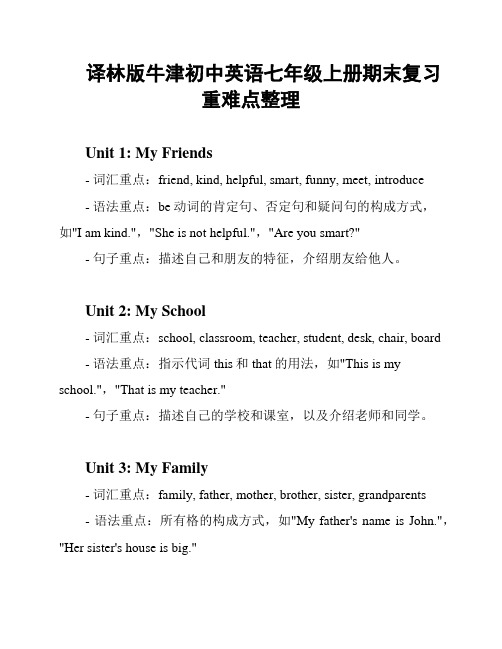
译林版牛津初中英语七年级上册期末复习重难点整理Unit 1: My Friends- 词汇重点:friend, kind, helpful, smart, funny, meet, introduce- 语法重点:be动词的肯定句、否定句和疑问句的构成方式,如"I am kind.","She is not helpful.","Are you smart?"- 句子重点:描述自己和朋友的特征,介绍朋友给他人。
Unit 2: My School- 词汇重点:school, classroom, teacher, student, desk, chair, board - 语法重点:指示代词this和that的用法,如"This is my school.","That is my teacher."- 句子重点:描述自己的学校和课室,以及介绍老师和同学。
Unit 3: My Family- 词汇重点:family, father, mother, brother, sister, grandparents- 语法重点:所有格的构成方式,如"My father's name is John.","Her sister's house is big."- 句子重点:描述自己的家庭和家庭成员,以及介绍家庭成员的特征和职业。
Unit 4: My Day- 词汇重点:day, morning, afternoon, evening, night, breakfast, lunch, dinner- 语法重点:一般现在时态的陈述句和疑问句的构成方式,如"I get up at 7 o'clock.","Do you have lunch at school?"- 句子重点:描述自己的一天,包括起床、用餐、上学等活动。
译林版牛津英语七年级上册期末复习知识点总结
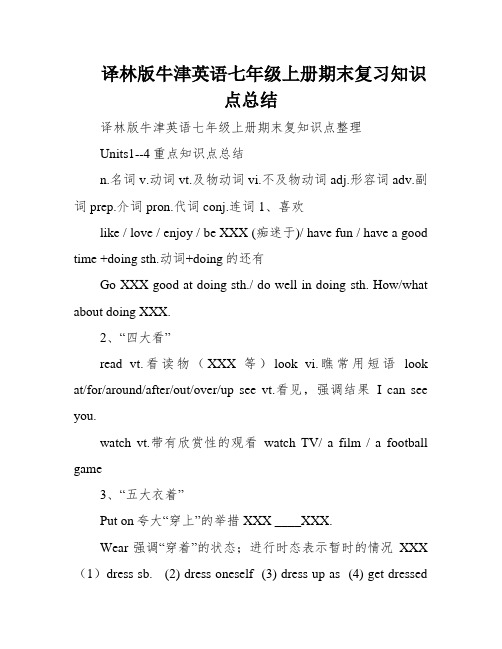
译林版牛津英语七年级上册期末复习知识点总结译林版牛津英语七年级上册期末复知识点整理Units1--4重点知识点总结n.名词v.动词vt.及物动词vi.不及物动词adj.形容词adv.副词prep.介词pron.代词conj.连词1、喜欢like / love / enjoy / be XXX (痴迷于)/ have fun / have a good time +doing sth.动词+doing的还有Go XXX good at doing sth./ do well in doing sth. How/what about doing XXX.2、“四大看”read vt.看读物(XXX等)look vi.瞧常用短语look at/for/around/after/out/over/up see vt.看见,强调结果I can see you.watch vt.带有欣赏性的观看watch TV/ a film / a football game3、“五大衣着”Put on夸大“穿上”的举措XXX ____XXX.Wear强调“穿着”的状态;进行时态表示暂时的情况XXX (1)dress sb. (2) dress oneself (3) dress up as (4) get dressedIn (穿戴)后接颜色(或衣服),表示状态look!Lucyis_____a red XXX后接人指衣服穿在某人身上看出区别来。
XXX red XXX.4、“四大花费”XXX:sb.(人)+ XXX.sb.(人)+ spend +工夫/款项+(in) XXX:sb.(人)+pay +款项+for sth. cost:sth.(物) + cost + sb.+款项XXX工夫XXX:it XXX sb. +时间+ to do sth.5、“三大地点副词”Home / there /here前不加任何的介词welcome home / come here / go there6、“三大使役动词”Make sb. do sth./ have sb. do sth. / let sb.do sth.7、见面打招呼用语(1)Nice to meet you . (2) Glad to meet you . (3) How are you ? (4) How are you doing ?(5)How is it going ?(6)How is everything going? (7) What’s up?8、基数词+year(s)+old表示“…岁”提问用“how old”名词性短语数词-year-old也表示年龄,但其为形容词性短语“前有冠词后有名(词)”Eg. Helen is 11 years old = Helen is an 11-year-old girl.9、Let’s与let us的区别Let’s do sth.指包孕听者(对方)和说者(我们)都在内,透露表现发起Let us do sth.指“让(答应)我们做某事”而听者(对方)不做,只要“我们”做10、play+the+乐器类名词e.g. Play the pianoPlay +球类运动play+ football / play cards / play chess11、She comes from Shanghai= She is from Shanghai .注:如何提问Shanghai及如何改一般疑问句12、be good at =do well in = be clever at = study sth. wellBe good at (反) be bad at do well in (反) be poor in13、介词over的用法(1)”在…正上方”There is a bridge over the river. (2)”超出”A plane flies over the house(3)”跨越”There are over 20 boys in this class. (4)”竣事”Class is over! / Game is over.14、every one与everyone辨析区分(1)Every one能够与of连用,而everyone却不克不及与of连用Eg.every one of the children XXX(2) everyone只指人=everybody而every one既指人又可指物配合点:谓语动词都要用“三单”15、family的用法:“家庭”作为团体谓语动词用“单数”He has a big family.“家人”夸大成员,是复数寄义,谓语动词用“真相”My family are at home.拓展:个人名词有people、class、police、sheep、deer、furniture等16、all/ both/ each/every/neither/ either的用法all(1)三者或三者以上“所有、都”(2)all + the +名词(all the afternoon = the whole afternoon)(3)all放在行为动词前,名词前;be动词后(4) all of +宾格/名词复数Both(1)两者都(2)后可跟of +宾格/名词复数Both sides of XXX指两个或两个以上“每个”个别Each side of the XXX.Every指许多人或事物的“全体”后接名词单数Every student is here .所有人都在。
牛津译林版英语七年级上册分单元知识点归纳总结(Unit1-8))

牛津译林版英语七年级上册全册知识点归纳总结(最新)Unit one一、词汇知识点整理:look after \ take care of 照顾;表示look 的短语:look after照顾look at 看…;look for 寻找look like 看起来像…on the first day 在第一天Class One, Grade Seven (先说班级,再说年级,且大写)。
play football 踢足球after school 放学后be\come from 来自be good at \do well in 擅长fly kites 放风筝go home 回家listen to music 听音乐play a game 玩游戏wear glasses 戴眼镜at school 在学校all the lessons 所有的课程talk about 谈论over there 那里 a lot of hobbies 许多爱好二、结构用法:love\like doing sth 喜欢做某事let’s +动词原形让我们I am\My name is 我叫welcome to +地点欢迎来到This is 这是be good at \do well in doing 擅长做in Class…Grade…在几年级几班be from = come from + 地点, 意思是“来自某地”。
He is from Nanjing. P8 他来自南京。
live with…in…和谁住在哪里live with sb 和某人住一起;live in+ 城市名,住在某地;live on the ground floor 住在一楼(用介词on)I’m …year old. 我几岁了。
year(s) old ,……岁,如果数词大于1,year 要用复数years. 问年龄要用How old “几岁”提问。
例如:- is your sister? --- She is 11. 应填How old.I have (short/long)hair.我留着短(长)头发三、句式用法What’s your name?你叫什么名字?Nice to meet you! 很高兴见到你。
译林版牛津初中英语七年级上册全册各单元短语、句型归纳整理
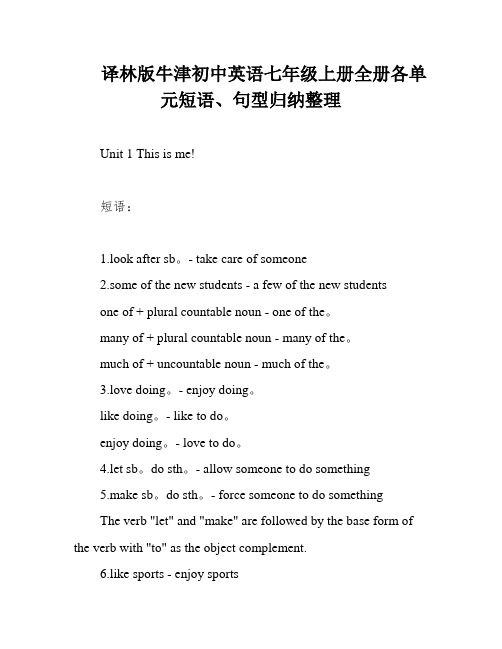
译林版牛津初中英语七年级上册全册各单元短语、句型归纳整理Unit 1 This is me!短语:1.look after sb。
- take care of someone2.some of the new students - a few of the new studentsone of + plural countable noun - one of the。
many of + plural countable noun - many of the。
much of + uncountable noun - much of the。
3.love doing。
- enjoy doing。
like doing。
- like to do。
enjoy doing。
- love to do。
4.let sb。
do sth。
- allow someone to do something5.make sb。
do sth。
- force someone to do somethingThe verb "let" and "make" are followed by the base form of the verb with "to" as the object complement.6.like sports - enjoy sports7.after class - after the classin class - during the class8.be good at (doing)。
- be skilled at (doing)。
9.meet my new friends - meet my new classmates10.over there - in that n11.tell sb。
about sth。
- inform someone about something12.Oh。
牛津译林版七年级上册英语Unit1语法总结

牛津译林版七年级上册英语Unit1语法总结1. 一般现在时一般现在时表示经常性、惯性或普遍性的动作或状态。
其构成为:主语 + 动词原形 (+ 其他补充成分)。
例句:- I play basketball every day.(我每天打篮球。
)- She likes reading books.(她喜欢读书。
)2. 句型:主语 + be + 形容词这种句型用来表达主语的状态或特征。
例句:- The weather is sunny today.(今天天气阳光明媚。
)- He is tall and handsome.(他又高又帅。
)3. 一般过去时一般过去时用来表示过去某个时间发生的动作或存在的状态。
其构成为:主语 + 动词过去式 (+ 其他补充成分)。
例句:- They went to the park yesterday.(他们昨天去了公园。
)- We lived in Shanghai five years ago.(我们五年前住在上海。
)4. 句型:主语 + be + 动词-ing这种句型用来表示主语正在进行的动作。
例句:- I am studying English now.(我现在正在研究英语。
)- They were playing soccer in the park yesterday.(他们昨天在公园踢足球。
)5. 一般将来时一般将来时用来表示将来某个时间将要发生的动作或存在的状态。
其构成为:主语 + will + 动词原形 (+ 其他补充成分)。
例句:- We will have a party next week.(下周我们将举行一个派对。
)- She will visit her grandparents tomorrow.(她明天将去看望她的祖父母。
)6. 句型:主语 + be + going to + 动词原形这种句型用来表示主语打算或计划将要发生的动作。
例句:- I am going to meet my friends this afternoon.(今天下午我将去见我的朋友。
牛津译林版七年级英语上册全册知识点归纳汇总
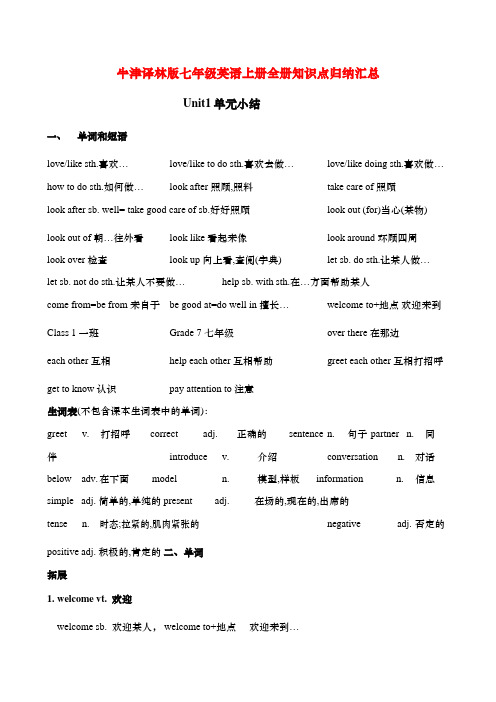
牛津译林版七年级英语上册全册知识点归纳汇总Unit1 单元小结一、单词和短语love/like sth.喜欢…love/like to do sth.喜欢去做…love/like doing sth.喜欢做… how to do sth.如何做…look after 照顾,照料take care of 照顾look after sb. well= take good care of sb.好好照顾look out (for)当心(某物) look out of 朝…往外看look like 看起来像look around 环顾四周look over 检查look up 向上看,查阅(字典) let sb. do sth.让某人做… let sb. not do sth.让某人不要做…help sb. with sth.在…方面帮助某人come from=be from 来自于be good at=do well in 擅长…welcome to+地点欢迎来到Class 1 一班Grade 7 七年级over there 在那边each other 互相help each other 互相帮助greet each other 互相打招呼get to know 认识pay attention to 注意生词表(不包含课本生词表中的单词):greet v. 打招呼 correct adj. 正确的sentence n. 句子 partner n. 同伴introduce v. 介绍conversation n. 对话below adv. 在下面model n. 模型,样板 information n. 信息simple adj. 简单的,单纯的 present adj. 在场的,现在的,出席的tense n. 时态;拉紧的,肌肉紧张的negative adj. 否定的positive adj. 积极的,肯定的二、单词拓展1. welcome vt. 欢迎welcome sb. 欢迎某人, welcome to+地点欢迎来到…You are welcome. 不用谢。
新牛津英语译林版七年级上册各单元全部重点短语和句子

7A 短语和句子n.名词v.动词vt.及物动词vi.不及物动词adj.形容词adv.副词prep.介词pron.代词conj.连词Unit 1 This is me1.look after sb. 照顾某人2.some of the new students 新学生中的一些one of + 可数名词复数…..中的一个many of + 可数名词复数…..中的许多.much of + 不可数名词…..中的许多3.love doing…. 热爱/喜爱做….like doing….喜爱做….enjoy doing…. 喜欢/享受做…sb. do sth. 让某人做某事5.make sb. do sth. 使某人做某事使役动词let, make后面接省to的动词不定式充当宾语补足语、6 like sports 喜爱运动7 after class 课后in class 在课上8. be good at doing…… 擅长做某事=do well in doing……my new friends 见见我的新同班同学there 在那边11. tell sb. about sth. 告诉某人关于某事12. Oh, I see. 哦,我明白了;13. wear glasses 戴着眼镜14. like all the lessons 喜欢所有的功课15. need作为行为动词的用法:need to do don’t / doesn’t need to do16.twelve years old 12岁17. \come from 来自于句子:1.How to look after your e-dog.如何照顾你的电子狗;2.I have short hair. = My hair is short. 我短发;3.Let’s meet my new classmates. 让我们见见我的新同学;4. She is tall and slim. 她高而苗条;5. Daniel is from Nanjing. Daniel来自南京;=Daniel comes from Nanjing.6. She loves dancing. 她热爱舞蹈;7. She is good at swimming. 她擅长游泳; = She does well in swimming.8. This is my cousin Andy. 这是我的表弟Andy.9. Andy, this is my new classmate Kitty. Andy, 这是我的新同学Kitty.10. I come from Nanjing, but now I live with my family in Beijing.我来自南京,但现在我和父母住在北京;11. They are all very nice. 他们都很好;Unit 2 Let’s play sports1. play sports 做运动 6. Walk to my bowl 走到我的碗边2. like walking 喜欢散步go for a walk 去散步take a walk 散步3. enjoy oneself = have a good time 玩得开心= have fun = play happily4. be free 有空be busy 繁忙5. hope to do sth. 希望做某事hope that + 句子希望+ 宾语从句7. come true 梦想实现,成为现实8. at/on weekends = at / on the weekend 在周末9. of course = certainly = sure 当然10. Many of my students 我的许多学生11. else 放在不定代词或疑问代词之后something else 别的东西what else 别的什么,还有什么12. a lot of = lots of 许多修饰可数名词、不可数名词some 一些修饰可数名词、不可数名词many 许多修饰可数名词much 许多修饰不可数名词13. fun 不可数名词乐趣、享乐、有趣的事What great fun 多么有趣的事啊14. talk about 谈论talk of 谈到,说到15. hero – heroes16. many times a day 一天很多次once a week 一周一次twice a month 一月两次tree times a year 一年三次17.my favourite football player 我最喜爱的足球队员18. a new member of Huanghe Football Club黄河足球俱乐部的一个新成员19. look strong 看起来强壮20. play football very well 足球踢得很21. in one’s free time 在某人的空余时间里22. enjoy listening to music 喜欢听音乐23. make sb. do sth. 使某人做某事make sb. + adj. 使某人……make him happy 使他们开心make me sad 使我悲伤24. activity ---- activities 活动25. watch ball games on TV 在电视上看球赛26. 对sometimes, often, usually, always, never, once a week, twice a month等表示频率的词或短语提问用how often / how about ……怎么样句子:1. Are you free = Do you have time 你有空吗2. What’s your favourite sport 你最喜欢的运动是什么3.He also enjoys listening to music. 他也喜欢听音乐;4. Li Hua wants to play in the next World Cup. 李华想参加下届世界杯;5.I hope his dream comes true. 我希望他的梦想实现;6.How does he look 他看上去怎样What does he look like 他看上去像什么7. Do your parents go with you你父母和你一起去吗8. My dad sometimes watches our games. 我爸爸有时候观看我们的比赛;9. My mum often shops at weekends. 我妈妈常在周末购物;10. I often stay at home. 我常待在家里;11. Many of my students like sports我学生中的许多喜欢运动;/我的许多学生喜欢运动;12. What else do you like to do你还喜欢做别的什么事吗13. It makes me feel great. 它使我感到很棒;14. I like reading too. 我也喜欢阅读;15. Me, too. Reading is fun. 我也是;阅读很有趣;16. I often play basketball with my friends after school. 我常在放学后与朋友一起打篮球;Unit 3 Welcome to our schoolthe Open Day 在开放日 2. be ready to do…. 准备好做….parents’ meeting 家长会4. at the school gate=at the gate of the school在学校大门口5. so big 如此大6. watch two of our lessons 观摩我们的两节课7. let me show you around 让我带你参观the ground floor 在一楼英9. this way 这边走10. by the way 顺便说说,顺便问一下11. have a meeting / have meetings at the school hall 在学校礼堂开会12. classroom building 教学楼14. be nice / kind to sb. 对某人好15. It’s very nice/kind of you to do sth.你做某事真好a diary diaries 写日记17. want to say hello to sb. 想向某人问好18. say goodbye to sb. 向某人告别say sorry to sb. 向某人道歉19. get to school 到达学校20. take the bus to school 乘公交车上学=go to school by bus=go to school on a / the bus21. ride a bike to school 骑自行车上学=go to school by bike=go to school on one’s bike23. live near the school 住学校附近24. live far away from the school 住得远离学校25,all kinds of books 各种可样的书26. borrow sth. from sb. 跟某人借某物27. borrow books from the library从图书馆借书28. on one’s way back 在某人回来的路上29. on one’s way home 在某人回家的路上30. on one’s way to school 在某人上学的路上31. Thank sb. for sth. 因为某事谢谢某人32. Thank sb. for doing sth. 为干某事谢谢某人you / Thanks for telling me how to have a party.谢谢你告诉我怎样举办一个晚会;34. all the best 一切顺利,万事如意35. write to sb. 给某人写信=write a letter letters to sb.句子:1. What’s your favourite subject=What subject do you like best2. Which of the subjects do you like best 这些科目中你最喜欢哪个’s the date today 今天几号=What date is it today’s that man in a white shirt 穿白衬衫的那个人是谁5. Our school is really nice. 我们学校真好;6. I can’t hear you well on the phone.在电话里我听不清你的话;7. It’s a long way from my home to the school.从我家到学校有很长一段路;8. The reading room is open. 阅览室是开着的9. ----When is it open 它什么时候开放-----It’s open from 8 . to 5:30 它从早上8点到下午5点半开放;10. It takes me about an hour to get to school.我到达学校大约要花费一个小时;11. What school do you study at你在哪个学校学习Unit 4 My day1. wake up 醒来2. between...and... 在...和...之间3. It’s time for sth. It’s time for sb. to do sth. 是某人干某事的时候了4. go walking in the hills 去山上散步5. seldom go out 很少外出6. need a good rest 需要好好休息=need to have a good rest7. need to do sth. 需要做某事8. From Monday to Friday 从周一到周五9. do morning exercises 做早操10. do eye exercises 做眼保健操11. do some exercise 锻炼12. have lessons 上课13. start begin lessons 开始上课14. do after-school activities 做课外活动15. be never late for work / school 上班/ 上学从不迟到16. one of ….. …….之一;后接可数名词复数17. be all nice to sb. 都对某人很好18. chat with sb. 和某人聊天19. chat with each other 互相聊天20. help each other 互相帮助21. play in the playground 在操场上玩22,be in the school volleyball team是校排球队成员=be a member of the school volleyball team23. practise after school 放学后训练practise doing sth. 练习/训练做某事24. on Wednesday afternoon 在周三下午25have a good time doing sth=have fun doing sth. 做某事过得愉快26. in spring / summer / autumn / winter 27. at 6 years old =at the age of 6 在六岁28. all the best 一切顺利,万事如意29. have much time to do sth. 有很多时间做某事30. have no time to do sth. 没有时间做某事31. go to her dancing lessons 去上舞蹈课32. dance for half an hour 跳舞半小时33. go roller skating 去溜旱冰34. visit a museum 参观博物馆on picnics with my family twice a month 一个月两次和我家人去野餐36..be good for sb. 对...有益37..be bad for sb. 有…..害38. get ready for sth 为...做好准备get ready to do sth 准备好做某事=be ready to do sth.39.. learn a lot about sth 关于某事了解很多40.. learn more about sth. 关于某事了解更多41. too much homework 太多作业42. too many lessons 太多课43. much too cold hot太冷热句子:1. Some dogs just don’t know how to have fun. 有些狗就是不知道怎样玩乐;2. What time do you start lessons 你们什么时候开始上课3. Our lessons begin at a quarter past eight. 我们的课于8:15开始;4.We have a Reading Club. 我们有一个阅读俱乐部;5.I also like playing volleyball. 我也喜欢打排球;6. We always have a good time at school.我们在学校总是过得很开心;7. Millie seldom chats with her friends after 很少与朋友在课后闲聊;8. I would like to tell you about my life here我想告诉你我在这儿的生活;9. We do not have lessons on Saturday or Sunday. 我们在周六和周日不上课;10. How often do they exercise 他们多久锻炼一次11. I hope everyone can come and watch the game. 我希望每个人能来看比赛;Wish our team good luck 祝我们队好运They help us get ready for the day他们帮助我们为一天做好准备;Unit 5 Let’s celebrateup 打扮 2.. dress up as a ghost 乔装打扮成鬼a guess 猜一猜 4. at Christmas = on Christmas Day 在圣诞节Festival中秋节 6. enjoy the full moon赏满月7. knock on / at people’s doors 敲人们的门8. play a trick on sb. / play tricks on sb.捉弄某人9. seem + adj. He seems very happy. seem to do… He seems to be very happy.He seems to like apples. It seems that + 句子; It seems that he is very happy. 他似乎很开心;10. be different from… 与…不同11 wear masks 戴面具12. have a party 开派对13. learn about different festivals around the world 了解全世界不同的节日14. a special day 特别的一天15. make pumpkin lanterns 做南瓜灯16. make lanterns out of pumpkins 把南瓜做成灯houses 串门18.. play a game with the people inside和里面的人做一个游戏dance 舞狮out 找到,发现 a lot of photos 拍很多的照片the world = all over the world全世界23. paint one’s face 给脸涂色24. on the evening of….. 在…..的晚上us some candy as a treat 给我们一些糖果作为招待= give us a treat of candy26 fun 不可数名词much fun 很多乐趣have lots of fun = have great fun 玩得开心What great fun 多么大的乐趣27. on Halloween 在万圣节前夕28. at a restaurant near my home 在我家附近的一家餐馆29. some other nice things 一些别的好东西30. what other things = what else 别的什么东西31. on the radio 在收音机里32 let off fireworks 放烟火33. watch the fireworks 看烟火34. a music and dance show一场音乐舞蹈表演35. most Chinese families 大多数中国家庭36.. at this time of year 在一年的这个时候句子1. Let’s celebrate. 让我们庆祝;2. What is your favourite festival =What festival do you like best 你最喜欢的节日是什么3. All my family get together and have a big dinner. 我所有的家人聚集在一起吃大餐;4. Thank you for telling me about the Mid- Autumn Festival. 谢谢你告诉我中秋节的情况;5. Children have lots of fun on that day. 在那天孩子们有很多的乐趣;’s really a special day. 这真是特殊的一天;7. Family members get together and give each other presents. 家庭成员聚集在一起并互送礼物;8. How do you usually celebrate your birthday 你通常怎样过生日9. What do you get as birthday presents 你得到什么作为生日礼物10. The Spring Festival is an important festival in China. 在中国春节是个重要的节日;11. I am on holiday in New York. 我在纽约度假;12. What do you do to celebrate the Chinese New Year in Beijing 你们在北京做什么事庆祝春节13. There is a great Spring Festival Gala on TV every year. 电视上每年都有盛大的春节联欢晚会;14. Children have lots of fun on this day. 孩子们在这一天玩得很开心;15. Usually our parents get new clothes ready for us. 我们的父母为我们准备好新衣服;16. We get red packets from our parents. 我们从父母那得到压岁钱;17. They are really wonderful. 他们真的很精彩Unit 6 Food and lifestyle1. all kinds of food 各种各样的食物2. keep fit = keep healthy 保持健康……away 远离4. plan to do… 计划做…planning5. more than 超过,多于6. dance for half an hour every day每天跳舞半小时7. feel hungry between meals在两餐之间感到饿8. Too much sugar 太多糖my lifestyle 改变我的生活方式swimming pool 一个游泳池11. four kilos of meat 四公斤肉12. five cartons of milk 五盒牛奶13. how to keep fit 如何保持健康14. less than 3 times a week 少于一周三次three to six times a week 一周三到六次15.exercise more 多运动16.eat less 少吃17.Have a look 看一看18. take a walk 散步19. All right,好的,行the day well 很好的开始一天21. taste good 尝起来不错;此处taste 为系动词22.. have a healthy lifestyle 有一个健康的生活方式句子1. It’s good for our health. 这对我们的健康有益;2. Healthy food is important for me.= It’s important for me to have healthy food.健康食物对我很重要;/对于我来说吃健康食物很重要;3. They have too much sugar and are bad for my teeth. 他们有太多的糖并对我的牙齿有害;4. I need to change my lifestyle now. 现在我需要改变我的生活方式;5. I plan to eat more fruit and vegetables every day. 我计划每天吃更多水果蔬菜;6. You need to exercise more and eat more healthy food.你需要多加锻炼并多吃健康食品;7. I seldom eat cakes or sweets. 我很少吃蛋糕和糖果;7. Let me have a look at the menu. 让我看一看菜单;8. What would you like to order 你们想要点什么9. Apple juice tastes good. 苹果汁尝起来不错;10. I often play football to keep fit. 我常踢足球保持健康;helps me start the day well. 这帮助我很好的开始一天;12. This meal gives me energy for the whole afternoon. 这顿饭为我整个下午提供能量;13. We need them to keep healthy. 我们需要他们来保持健康;14.. An apple a day keeps the doctor away. 一天一苹果,医生远离我;Unit 7 Shopping1. come with me 跟我来2. need sb. to do sth. 需要某人做某事3. flower / shoe /gift shop 花/鞋/礼品店clothes / sports shop 服装店/体育用品商店4. go shopping = do some shopping = buy some things 购物/买东西5. hate doing…/ hate to do…. 讨厌做….6. be interested in doing sth. 对做…感兴趣the street 沿着这条街8. be sure 确信、相信9. just a minute = wait a minute = wait a moment = wait for a short time 稍等片刻10.enough修饰adj./adv.时喜欢放在后good enoughenough修饰n.时常放在前面enough moneyall the bags 拎所有的包12. wait for….. 等待…13. be different from… 与….不同14. the same as…. 与…一样15. another 又一,另一,用于三者或以上a look看一看much 多少钱18. price用高、低high, low形容,不用贵、便宜形容19. . buy Simon a present 买给西蒙一个礼物= buy a present for Simon 为西蒙买一个礼物20. last year’s cards 去年的卡片21. different kinds of hair clips 不同种类的发卡22. go well with… 与…很配23. help the children in some poor areas帮助一些贫困地区的孩子24. walk a long way to school 走很长的路上学25. try on 试穿26. one floor of restaurants 一个楼层的饭馆27.. on the top floor 在顶楼句型1.There’s a new mall down the street.沿着这条街走有一个新建的大型购物中心;2.What can I help you/Can I help you您需要什么3.How much do they costHow much are they他们多少钱’ll take /buy them.我就买它们;5.. Not far away from my school, there is also a supermarket. 离我学校不远也有个超市;need books most. 他们最需要书;7.. We can use our pocket money to buy them these things. 我们可以用零用钱买给他们这些东西;8. Thank you for your help. 谢谢你的帮助;9.. What’s your size Size 40. 你穿几码40码;10.. They fit very well. 他们很合适;11. Can we see another pair 我们可以再看一双吗12.. There are five floors of shops. 有五层楼的商店;13. There are foods from different areas. 有来自不同地区的食物;14.. The mall is a good place to meet friends and have fun.这个购物中心是与朋友见面和玩乐的好地Unit 8 Fashion1. spend +时间/钱+ on sth. 花时间/钱在..上.spend +时间/钱+ in doing sth.花时间、钱做某事2. so lazy 如此懒惰3.. sports clothes 运动服4. lend sth. to sb. = lend sb. sth.把某物借给某人5.. borrow sth. from sb. 跟某人借某物6.. between ….and …在...与…之间用于两者之间7. be made of… 由….制成能看出原材料be made from…由….制成不能看出原材料be made in + 地点产于某地be made by + 人被…制造8.下列的fit 为adj. be fit for …. 适合于…They are fit for a long walk. 他们适合长时间步行14. 下列fit为v. They fit me very well. 他们很适合我;The coat doesn’t fit me.那件外套不适我;15. ten more minutes = another ten minutes 再多10分钟16. hold / have/ give a fashion show 举办一个时装展17. design a poster for the “Fashion Wall”给Fashion Wall设计一张海报18. show you different styles of clothes给你看不同式样的衣服19. look smart / modern and beautiful 看起来时尚和漂亮20.. look great in white创白色很棒21. both of them 他俩都22. a black wool skirt 一件黑色羊毛短裙23. a pair of long red leather boots 一双红色长筒皮靴24. 感叹句的构成:1、What + n.短语+ 主语+ 谓语What a great show it is 这是多棒的表演啊What tall buildings they are 他们是多高的楼啊What fine weather it is 这是多好的天气啊2、How + adj./adv. + 主语+ 谓语How great the show is 表演多棒啊How tall the buildings are 这些楼多高啊How fine the weather is 天气多好啊25.most young people 大多数年轻人26. wait for the school bus 等校车27. lie on the bed 躺在床上28. go for a dinner 去赴宴29. have to do sth. 必须/不得不做某事30. feel soft and smooth 摸上去柔软光滑句型1. What do you think of …. = How do you like ….. 你认为….怎么样2. I’m thinking about what to wear. = I’m thinking about what I should wear.我正考虑穿什么3. I can spend ten more minutes in bed then. 那么我可以在床上多待10分钟了;4. Would you like one more apple = Would you like another apple 你想再要一个苹果吗5. Can you lend us your red blouse for our fashion show, Mum妈妈,你能把你的红衬衫借给我们参加时装表演吗6. What size is your blouse Size 4. 你的衬衫是什么尺寸大小4;7. Trainers are light and comfortable and are popular among young people.8. Here comes Simon. 西蒙走来了;9. That’s all for today’s show.= So much for today’s show. 今天的表演到此结束;for coming. 感谢光临;11. You look great in your purple shirt. 你穿紫色衬衫看起来棒;12. The purple shirt looks great on you. 紫色衬衫穿在你身上看起来棒;13. That pair of long boots is made of leather. 那双长靴是皮革制成的;14. The jacket is not too long or too large. 这夹克不太长也不太大;15. My design includes a pair of blue jeans. 我的设计包括一条蓝色牛仔裤;。
Unit1知识点整理牛津译林版七年级英语上册

7A Unit 1 知识点整理1.love/like sb./sth. 喜欢某人/某物love/like to do sth. 喜欢做某事(一时喜欢,常指一个具体的动作) love/like doing sth. 喜欢做某事(一直喜欢,可以指兴趣爱好)●I like watching films. I like Liu Dehua and his films. But don’t like to watch a film with my friend this afternoon.2.edogs(复数)/an edog(单数) 一只电子狗●edog/'i:dɒg/ 音标最前面是元音音素,所以用an3.What’s your name? My name is...你叫什么名字?我的名字是......What’s his/ her name? His/Her name is...他/她叫什么名字?他/她的名字是......●what’s=what is 看名词name,name单数用is,names复数用are4.in Class One, Grade Seven 在七年级一班●先班级后年级都大写5.read this book读这本书●My grandfather likes reading books and newspapers.6.look after =take care of 照顾I often look after my little sister.=I often take care of my little sister.●I often look after her well.=I often take good care of her.7.how to do sth. 如何做某事●I don’t know how to learn English well.8.Good morning / afternoon / evening. 早上/下午/晚上好。
译林牛津初一上册英语知识点归纳
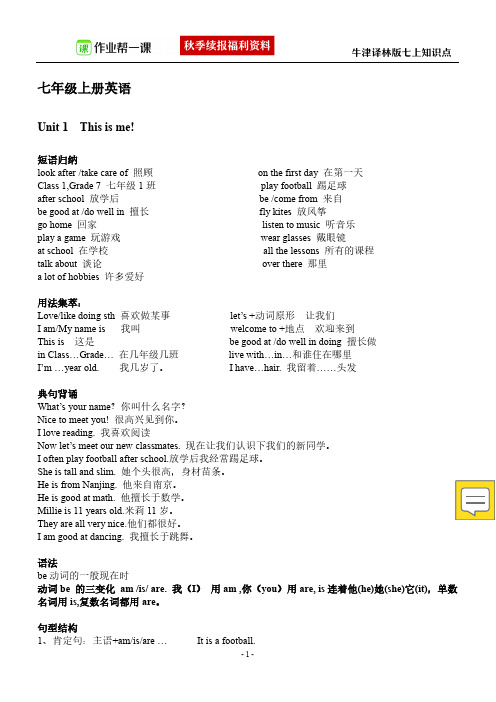
牛津译林版七上知识点
Unit 1 This is me!
短语归纳
look after /take care of 照顾 Class 1,Grade 7 七年级 1 班 after school 放学后 be good at /do well in 擅长 go home 回家 play a game 玩游戏 at school 在学校 talk about 谈论 a lot of hobbies 许多爱好
牛津译林版七上知识点
Unit 2 Let's play sports!
短语归纳
play sports 做运动
many times a day 一天许多次
play football/tennis 踢足球/打网球
talk about 谈论
after school 放学后
go swimming 去游泳
a member of …中的一员
2、否定句:主语+am/is/are+not… It is not a football. 3、一般疑问句:Am/Is/Are+主语+其他?
Is it a football? 回答 Yes, it is. No, it isn’t. 4、特殊疑问句:疑问句+am/is/are +主语+其他?
What’s your name?
far away from 远离 learn about 学得,获知 after class 下课后 all kinds of 各种各样 look at 看 on the wall 在墙上 in front of 在……前面 go to school 去上学 borrow from 从……借…… on the Open Day 在开放日
Unit+1+知识要点梳理总结 牛津译林版七年级英语上册
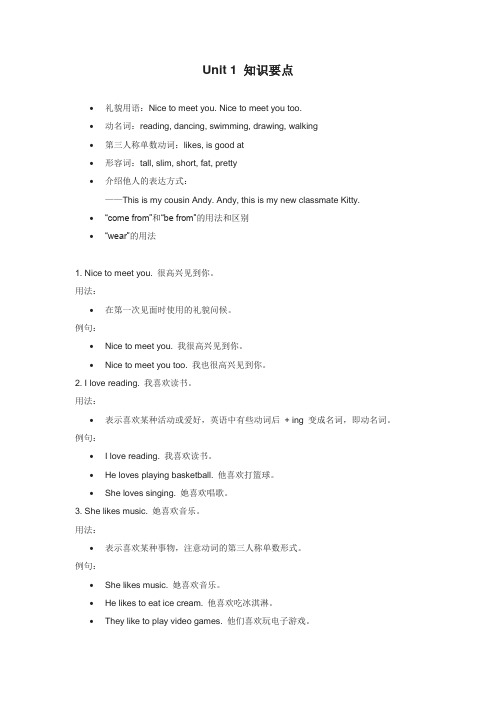
Unit 1 知识要点•礼貌用语:Nice to meet you. Nice to meet you too.•动名词:reading, dancing, swimming, drawing, walking•第三人称单数动词:likes, is good at•形容词:tall, slim, short, fat, pretty•介绍他人的表达方式:——This is my cousin Andy. Andy, this is my new classmate Kitty.•“come from”和“be from”的用法和区别•“wear”的用法1. Nice to meet you. 很高兴见到你。
用法:•在第一次见面时使用的礼貌问候。
例句:•Nice to meet you. 我很高兴见到你。
•Nice to meet you too. 我也很高兴见到你。
2. I love reading. 我喜欢读书。
用法:•表示喜欢某种活动或爱好,英语中有些动词后+ ing 变成名词,即动名词。
例句:•I love reading. 我喜欢读书。
•He loves playing basketball. 他喜欢打篮球。
•She loves singing. 她喜欢唱歌。
3. She likes music. 她喜欢音乐。
用法:•表示喜欢某种事物,注意动词的第三人称单数形式。
例句:•She likes music. 她喜欢音乐。
•He likes to eat ice cream. 他喜欢吃冰淇淋。
•They like to play video games. 他们喜欢玩电子游戏。
4. He is good at Maths. 他数学很好。
用法:•表示擅长某方面。
例句:•He is good at Maths. 他数学很好。
•She is good at dancing. 她跳舞很厉害。
•They are good at playing football. 他们踢足球很厉害。
- 1、下载文档前请自行甄别文档内容的完整性,平台不提供额外的编辑、内容补充、找答案等附加服务。
- 2、"仅部分预览"的文档,不可在线预览部分如存在完整性等问题,可反馈申请退款(可完整预览的文档不适用该条件!)。
- 3、如文档侵犯您的权益,请联系客服反馈,我们会尽快为您处理(人工客服工作时间:9:00-18:30)。
初一英语上册知识点整理归纳一、48个国际音标及26个英文字母的正确书写要熟练掌握元音和辅音,5个元音字母(a,e,i,o,u),字母的正确占格及单词间距。
二、be动词的用法be动词有三种变形,分别是:am,is,are。
记忆口诀:"我"用am,"你"用are,is用于"他、她、它";单数全都用is,复数全部都用are。
三、人称及人称代词的不同形式(主格和宾格)1、三种人称:第一人称(I,we),第二人称(you,your),第三人称(he,she,it,Maria)。
2、人称代词的主格,即人称代词位于句子主语位置时的形态:I,We,You,Your,He,She,It,Maria。
3、人称代词的宾格,即人称代词位于句子宾语位置时的形态:me,us,you,you,him,her,it。
4、形容词性物主代词:my,our,your,your,his,her,its,their。
5、名词性物主代词:mine,ours,yours,yours,his,hers,its,theirs。
6、反身代词:myself,oursel ves,yourself,yourselves,himself,herself,itself,themselves。
四、基数词(表示数量多少的词,大致相当于代数里的自然数)zero,one,two,th ree,fo ur,five,six,seven,eight,nine,ten,eleven,twelve,thirteen,fourteen ,fifteen,sixteen,seventeen,eighteen,nineteen,twenty,twenty-one,twenty-two,twenty -three,twenty-four,twenty-five,twenty-six,twenty-seven,twenty-eight,twenty-nine,t hirty,forty,fifty,sixty,seventy,eighty,ninety,one hundred,one hundred and one。
五、一般疑问句及特殊疑问句1、一般疑问句:能用Yes或No来回答的问句。
一般疑问句句尾读升调。
2、特殊疑问句:不能用Yes或No来回答的问句。
特殊疑问句句尾读降调。
六、可数名词变复数可数名词变复数时,有规则变化和不规则变化两种。
1、规则变化:(1)一般情况直接在词尾加"-s",如:c ake-cakes,bag-bags,day-days,face-faces,orange-oranges等;(2)以s,x,sh,ch结尾的词,要在词尾加"-es",如:bus-buses,watch-watches,box-boxes 等;(3)以辅音字母加y结尾的词,变y为i再加"-es",如:baby-babies,country-countries,family-families等;(4)部分以f(e)结尾的词,变f(e)为"ves",如:knife-knives,half-halves等;(5)以o结尾的词,加"-s"或"-e s",如:zoo-zoos,photo-photos,tomato-tomatoes,potato-potatoes等。
记忆口诀:除了"英雄"hero外,凡是能吃的,加"-es",不能吃的加"-s"。
2、不规则变化:(1)改变单数名词中的元音字母:man-men,woman-women,foot-feet,tooth-teeth等;(2)单、复同形:sheep-sheep,Chinese-Chinese,Japanese-Japanese等;(3)其他形式:mouse-mice,child-children等。
七、简单句的成分及主谓一致原则最基本构成:主语谓语宾语,其中谓语由动词来充当。
主谓一致原则,就是句子的谓语要始终与主语保持数量上的一致性。
当主语是第三人称单数(简称"三单")时,谓语动词也要相应变成单数形式;当主语非"三单"时,谓语动词就用原形。
实意动词变"三单"的规则如下:(1)一般动词在词尾加"-s",如:like-likes,tell-tells,play-plays等;(2)以字母s,x,c h,sh结尾的动词加"-es",如:guess-guesses,teach-teaches,watch-watches等;(3)以o结尾的动词一般加"-es",如:do-does,go-goes等;(4)以辅音字母加y结尾的动词,先变y为i,再加"-而是",如:fly-flies,carry-carries等;(5)have的三单形式是has。
八、冠词的用法(名词前面必须要有冠词)冠词分为定冠词(the)和不定冠词(a,an)两种。
1、定冠词the表示"特指",可译为"这个"、"那个"、"这些"、"那些"。
2、不定冠词a,an用来表明(可数)名词的数量是"一个"。
an用于以元音开头(注意不是以元音字母开头)的单词前,a则英语非元音开头的单词前。
3、不定冠词a,an与基数词one的区别是:不定冠词不是刻意强调"数量",而基数词则强调"数量"。
九、助动词(do,does)的用法只有实意动词作谓语时才涉及使用助动词。
以like为例:(1)当句子为肯定句时不涉及使用助动词,只涉及"主谓一致"原则。
eg:I like English a lot.Michael likes Chinese food very much.(2)当句子为否定句时,要根据主语的人称来决定使用相应的助动词:当主语为"三单"时,要使用does;当主语为"非三单"时,用助动词原形do。
例如把下列句子变否定句:Kangkang likes math.----Kangkang doesn't like math.They like sports.------They don't like sports.(3)当句子变疑问句时,同样要根据句子的主语来决定在句首使用Do或Does.例如下列句子变问句:Michae l like s Chinese Food.----Does Michael like Chinese food?Yes,he does./No,he doesn't.Jane and Hele n like music.----Do Jand and Helen like music?Yes,they do./No,they don't.十、名词所有格1、Kangkang's books;Tom and Helen's desk;Ann's and Maria's bikes;2、用of表示"......的",但要从of后往of前翻译:a book of mine(我的一本书)3、have与of的区别:have一般表示"主动拥有",往往用于有生命的人或动物;无生命的物体一般不能"主动拥有",表示所属关系时要用of。
例如:I have a new bike.She has two big eyes.a door of the houseUnit 1-Unit 2(1)问候语:Good morning/afternoon/evening.How are you?---Just OK,thank you.How are you?---Not bad,thanks.Hi!Hello!How do you do?(2)道别用语:Nice/Glad to meet/see you.(meet用于初次见面,see用于熟人间)Nice to meet/see you,too.Goodbye.Byeby e.Bye.See you(later/tomorrow/next time)!So long!Good night!(3)介绍人或者物的句型:This is...(4)Excuse me.与I'm sorry.的区别:Excuse me.是要引起对方的注意,而I'm sorry.则是向对方道歉。
(5)词组be from=come from(6)当问句中问到th is/tha t时,回答要用it;问到these/those时,要用they来回答。
例如:What's this in English?----It's an eraser.What are those?----They are books.(7)对Thanks.的回答:That's OK./You're welcome./My pleasur.(8)look the same=have the same looksgive sth.to sb.=give sb.sth.be like=look likein the tree/on the tree(树上结的、长出来的用on,否则用in)in red(穿着红色的衣服)in the desk(在空间范围之内)in English(用英语)help sb.do sth.(9)both与all的区别:both表示"两者都......";all表示"三者及以上都......"。
Unit 3-Unit 4(1)speak的用法speak与say不同:speak表示"说"的动作,不表示"说"的内容;say则表示"说"的内容。
speak后面除了能接"语言"外,不能直接接东西,后面加了to则表示"对......说"。
help sb.with sth.(帮助某人做/补习......)want to do sth.(想要做某事)would like to do sth.not...at all(一点都不);Not at all.(没关系/别介意)like...a lot=like...very much(2)some和any的区别:口诀:some用于肯定句,否定、疑问变any。
